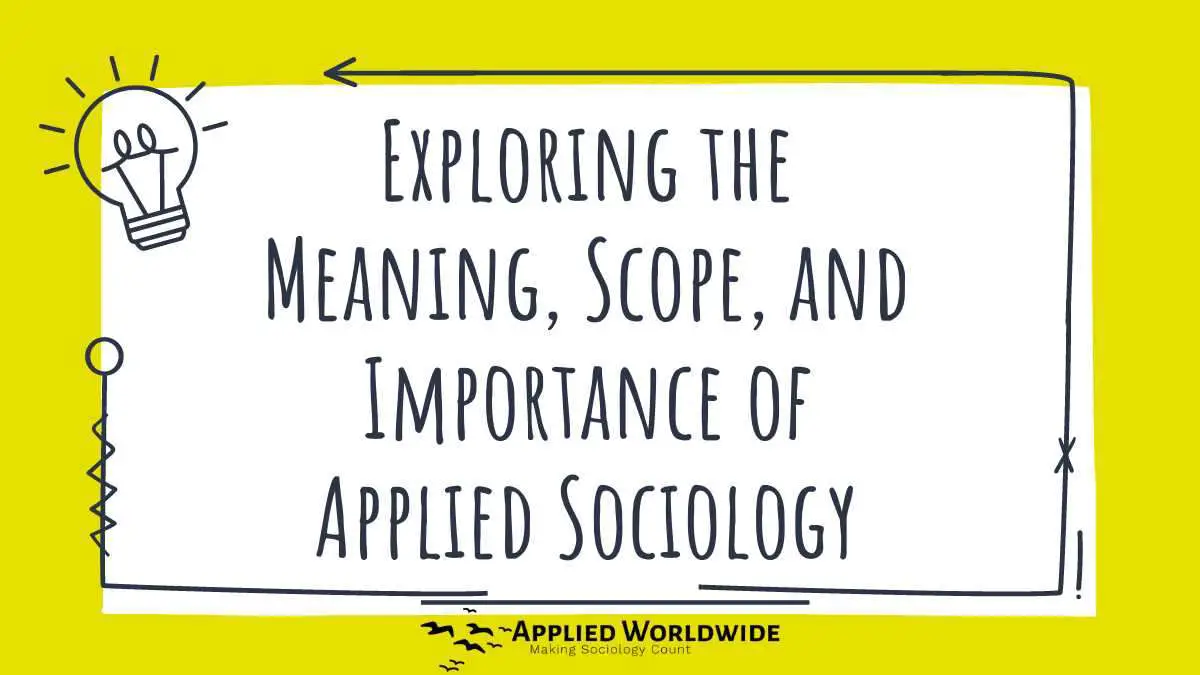Sociology is the study of social life, social change, and the social causes and consequences of human behavior. It is a discipline that is concerned with understanding the relationships between individuals and society, and the impact of social forces on human behavior. Applied sociology is the practical application of sociological theory and research methods to solve social problems and improve social conditions. In this article, we will explore the meaning, scope, and importance of applied sociology.
Meaning and Scope of Applied Sociology
Applied sociology is the practical application of sociological knowledge to solve social problems. It involves the use of sociological theories, concepts, and methods to understand and address issues in different fields, including education, health, social welfare, criminal justice, and business. Applied sociologists work with government agencies, non-profit organizations, and private sector organizations to design and implement social programs, policies, and interventions that improve social conditions.
Applied sociology is interdisciplinary, drawing on theories and methods from other fields, such as psychology, economics, and anthropology. It requires sociologists to collaborate with professionals from other disciplines, including policymakers, educators, healthcare professionals, and social workers. Applied sociology is also dynamic and constantly adapting to changing social and economic conditions.
Importance of Applied Sociology
Applied sociology plays a critical role in addressing social problems and improving social conditions. Sociological research helps us understand the complex social forces that shape human behavior and the social institutions that perpetuate inequalities. By using this knowledge to design and implement social programs, policies, and interventions, applied sociologists can make a significant impact on society.
Applied sociology is particularly important in addressing social inequality. Sociologists have long been interested in studying the causes and consequences of social inequality, and how it can be reduced or eliminated. By working with policymakers, social workers, and other professionals, applied sociologists can design and implement programs and policies that reduce poverty, improve educational outcomes, and promote social justice.
Applied sociology is also important in addressing social problems related to health and well-being. Sociologists have studied the social determinants of health, such as poverty, social isolation, and discrimination, and how they impact health outcomes. By using this knowledge to design and implement health interventions, applied sociologists can improve health outcomes for individuals and communities.
Examples of Applied Sociology
Applied sociology can take many forms, depending on the social problem being addressed and the context in which it is being addressed. Some examples of applied sociology include:
- Social policy analysis: Sociologists can analyze social policies to assess their impact on social inequality, poverty, and other social problems. By identifying gaps and areas of improvement, sociologists can provide recommendations for policy change. Check out one example of an applied sociologist uses sociology to inform foreign policy.
- Program evaluation: Sociologists can evaluate the effectiveness of social programs and interventions to determine if they are achieving their intended outcomes. By assessing program outcomes, sociologists can identify best practices and areas for improvement.
- Community organizing: Sociologists can work with communities to identify social problems and design interventions that address them. By working with community members, sociologists can build capacity and empower communities to take action on social issues. You can read more on working with communities from our profile interview with applied feminist sociologist Dr. Özlem Altıok.
- Corporate social responsibility: Sociologists can work with businesses to develop socially responsible practices that address social problems. By promoting ethical and sustainable practices, sociologists can help businesses improve their social impact.
Concluding Thoughts on the Meaning, Scope, and Importance of Applied Sociology
Applied sociology is the practical application of sociological knowledge to solve social problems and improve social conditions. It involves the use of sociological theories, concepts, and methods to address issues in various fields, including education, health, social welfare, criminal justice, and business. This field is interdisciplinary and dynamic, requiring collaboration with professionals from other disciplines and adapting to changing social and economic conditions.
Applied sociology plays a critical role in addressing social inequality, improving health outcomes, and promoting social justice. Through this practical application of sociological knowledge and skills, sociologists can make a concrete difference in the world through their work with individual professionals, organizations, and communities.







